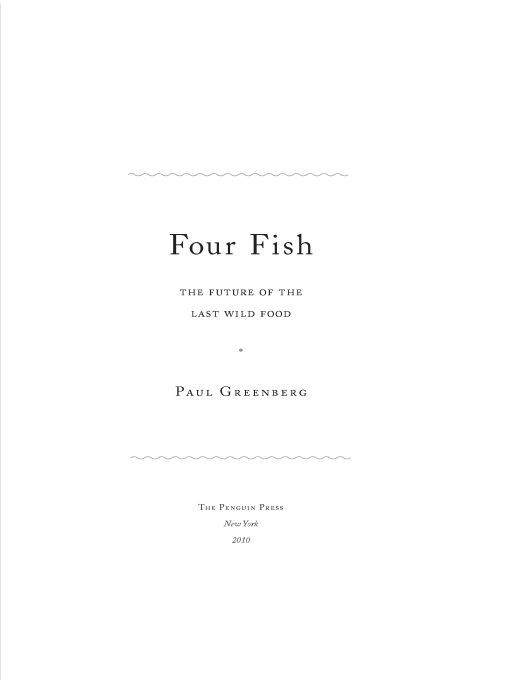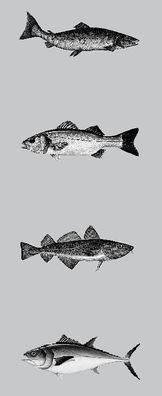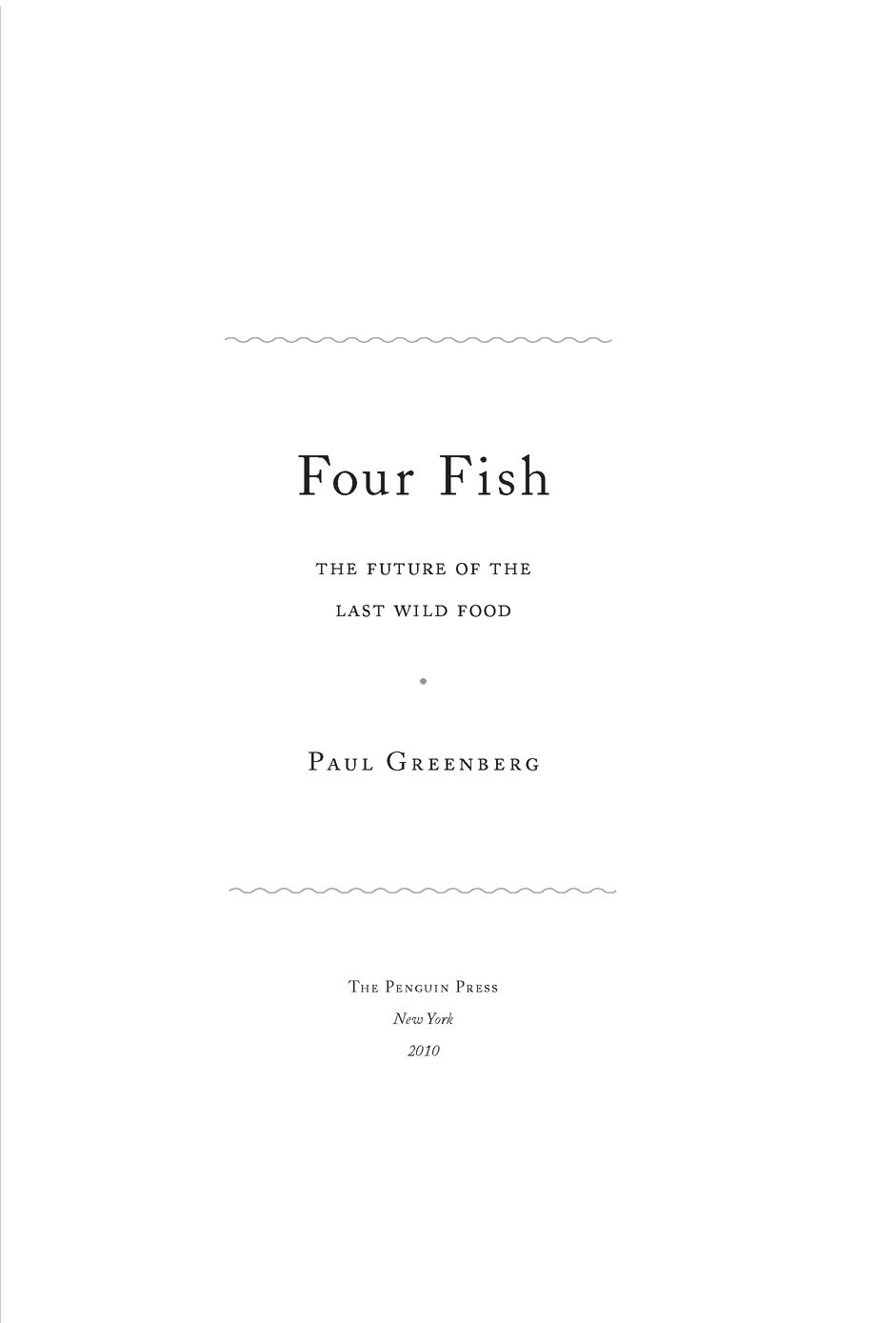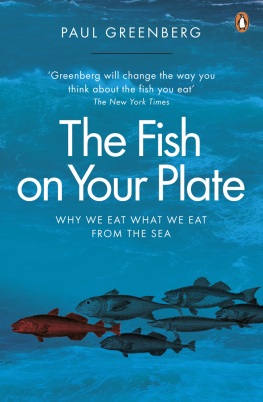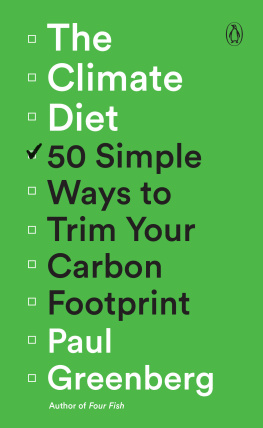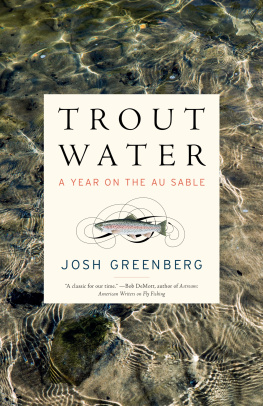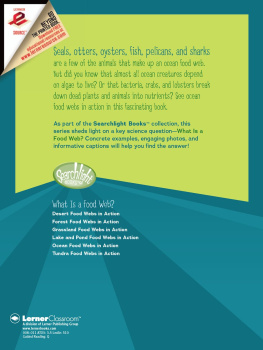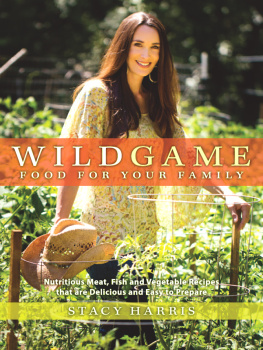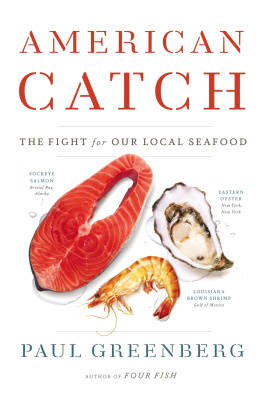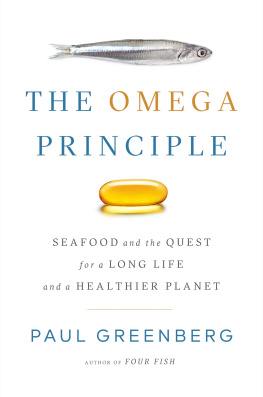Table of Contents
ALSO BY PAUL GREENBERG
Leaving Katya: A Novel
For Esther, who knows the depths
Fish is the only grub left that the scientists havent been able to get their hands on and improve. The flounder you eat today hasnt got any more damned vitamins in it than the flounder your great-great-granddaddy ate, and it tastes the same. Everything else has been improved and improved and improved to such an extent that it aint fit to eat.
a Fulton Fish Market denizen, in Old Mr. Flood by Joseph Mitchell, 1944
Introduction
In 1978 all the fish I cared about died. They were the biggest largemouth bass I had ever seen, and they lived in a pond ten minutes walk from my house on a large estate in the backwoods of Greenwich, Connecticut, perhaps the most famously wealthy town in America. We did not own the house, the estate, the pond, or the largemouth bass, but I still thought of the fish as my fish. I had found them, and the pond was my rightful hunting ground.
My mother had rented the house as she would three other homes in Greenwich, because it gave the illusion of magnificent proprietorship. She tended toward small cottages on large estatesconverted stables, liverymens accommodations that were the unclaimed, declining appendages of older, fading wealth, unsold because of divorces or other family complications, rented out to us for a reasonable fee that would become unreasonable and impel our moving on to other cottages on other collapsing estates.
Fishing was the one constant during these years. Sensing in it a masculine, character-building quality, my mother arranged it so that the cottages we rented always had access to streams and lakes or abutted other properties we could trespass upon that had such resources. She trusted my instincts for spotting fishy water and used me as a kind of divining rod before signing a lease. And for most of my childhood, we were within a short walk of a potentially fruitful cast. Our longest residence was in the aforementioned house near the giant largemouth bass. In the first two years we lived there, I spent all my summer evenings and weekend mornings pursuing them.
In the winter of 1978, though, a fierce blizzard hit southern Connecticut. Temperatures were often below zero and at one point it snowed for thirty-three hours straight. Perhaps it was the cold that killed the fish, or the copper sulfate I helped the caretaker drag through the pond the previous summer to manage the algal blooms, or maybe even the fishermen Id noticed trespassing on the estate one day, scoping out my grounds. But whatever caused it, after that winter never again did I spot a living fish. Of course I tried. I trolled pretty much every square foot after school the following year, often with a neighbor who had moved in after the era of the great fish. When two months of dragging lures up and down the shoreline produced not even a strike, my neighbor finally stuck a pin in my irrational bubble of hope.
I dont care what you say about what was, I remember him shouting. There is not a fucking fish in this whole goddamn lake, and Im never fishing here again.
Like any hunter whose grounds have gone bad, I set out looking for new territory. I followed the outflow of the pond down a series of cascades that in turn flattened out into a low, swampy meadow of deep oxbows. Only minuscule shiners, crawfish, and escaped goldfish swam here. Farther and farther I went, until the stream joined a larger river and passage was blocked by a fence that a wealthy land-owner had erected. Inspecting a map at the library, I found that this was a significant juncture for my stream (as with my pond, I had annexed the stream and referred to it now as mine). The point at which it was no longer my stream was where it entered the Byram River, a flow that during the times of Native American sovereignty was called the Armonck, or fishing place, but which, according to one local legend, the English renamed because of the native tendency to pester white men with armfuls of shad and herring for trade and the endlessly repeated entreaty Buy rum? Buy rum? The Byram continued south for another ten miles after the juncture before widening and finally emptying out into the sea. The beginning of an idea came to me.
Several hundred dollars made it into my account after an ersatz bar mitzvah that my partially Jewish family cobbled together for me when I turned thirteen, and through a debt-leveraged matching grant from the depths of my mothers complicated finances I was able to purchase a used aluminum boat and a twenty-horsepower outboard engine. Using her good figure and her ability to forge solidarity with the working classes (she had been a friend of the American socialist Michael Harrington and was an experienced strike aide-de-camp), my mother persuaded the Greenwich harbormaster to let us jump the waiting list for a boat slip at the Grass Island Marina. By the summer of 1981, I had a boat, a place to store it, and several thousand square miles of sea for my own use. Better hunting grounds had been found at last.
This was not the time of child seats or swallowproof soda-can tabs. No safety seals secured Tylenol bottles or yogurt containers. Today it would be considered parental negligence, but in that first summer of boat ownership my mother would drive me down to the Grass Island Marina, seat belt-less, in her black secondhand luxury-edition Chrysler Cordoba and drop me off at my thirdhand boat. As I finished dumping my gear out of her trunk, she would light a Dunhill cigarette, cough heavily, and then, with a glance in her rearview, speed off into the childless afternoon ahead of her. So, at the age of thirteen, I learned how to navigate and fish on the sea by myself. It wasnt difficultIm sure most children, given the opportunity, could have figured it out. Once upon a time, being thirteen really did mean you were a man. But the feeling of steaming out into open water in pursuit of wild game, leaving the financial and physical constriction of mainland Connecticut behind, was exhilarating.
I did not have a GPS to plot my position or sonar to help me find fish. There was no cell phone to check in with home. I learned to find quarry by chasing flocks of diving terns or following a line of rocks from the shore with the assumption (usually right) that they indicated similar fish-holding rock piles down below the surface. If a rivet came loose from the hull of my boata sometime occurrence, since the hull had not been anodized to withstand salt waterI would slip off a flip-flop and hold the errant piece of metal in place with my big toe. I was sometimes able to persuade my older brother to join me, but midway through that first summer he announced that he no longer wanted to kill things. I didnt mind. I was happy to be alone with the fish and the ocean.
By my second year of boat ownership, I began to understand the flow of fish as they came and left Long Island Sound. St. Patricks Day, around when the forsythias first bloomed, was the time to test the mudflats for flounder just off the Indian Harbor Yacht Club docks. By April, when the forsythia shriveled to brown and the dogwoods came into flower, mackerel would have passed into the Sound and blackfish would be on the reefs surrounding Great Captain Islanda sure sign that it was time to put the boat in the water. Soon the lilacs would blossom, heralding the arrival of the first weakfish and porgies in May. And by the time lawns were being mowed with ferocity ashore, bluefish were coming into the harbors, devouring the mackerel and menhaden and everything else that had the misfortune to get in their way.

